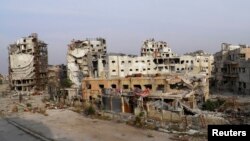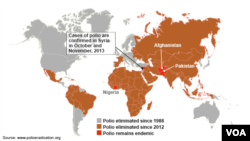The commander of the rebel Free Syrian Army says his group will not participate in a peace conference planned for January in Geneva and intends to pursue its fight to topple President Bashar al-Assad regardless.
General Salim Idriss told Al Jazeera television Tuesday that "conditions are not suitable for running the Geneva 2 talks" and that the FSA "will not stop combat at all during the Geneva conference or after it."
The country's main exiled opposition group, the Syrian National Coalition, said it has not made a final decision on whether to attend the talks, while again insisting Mr. Assad should play no role in the country's political future.
The United Nations set January 22 as the date for the Geneva conference with the stated goal of forging a transitional government to end the more than 2-year-old conflict that has killed well over 100,000 people and displaced millions more.
Iran's foreign minister said Tuesday that, if invited, Iran will participate in the Geneva 2 conference without any preconditions.
"We have said all along that if Iran is invited we will participate without any preconditions. But the point is for us in Iran, finding a resolution to the crisis in Syria constitutes a matter of national importance and it is a national priority for us. So, whether invited or not, we will continue to support a political process in Syria."
Meanwhile, the Syrian government said it would push on with its war against "terrorism" as state media announced 15 people were killed and more than 30 wounded in a suicide attack at a bus station in a Damascus suburb.
Syrian television said all fatalities were civilians but the Britain-based Syrian Observatory for Human Rights said six of the dead were soldiers and that two children were also killed in Soumariya, a major hub for transport in and out of the capital.
Earlier Tuesday, the World Health Organization said it confirmed two new cases of polio in Syria. An outbreak of 15 cases was found in northeastern Syria last month, prompting the largest-ever polio immunization campaign in the region.
The U.N. health agency said the virus has now infected a child in rural Damascus and another in the northern city of Aleppo.
The polio outbreak is the first in Syria since 1999. The WHO has warned of the high risk of the virus spreading because of large population movements in response to the country's ongoing crisis.
The agency is working to vaccinate 20 million children in seven countries and territories in an operation it expects to continue for at least six to eight months.
General Salim Idriss told Al Jazeera television Tuesday that "conditions are not suitable for running the Geneva 2 talks" and that the FSA "will not stop combat at all during the Geneva conference or after it."
The country's main exiled opposition group, the Syrian National Coalition, said it has not made a final decision on whether to attend the talks, while again insisting Mr. Assad should play no role in the country's political future.
The United Nations set January 22 as the date for the Geneva conference with the stated goal of forging a transitional government to end the more than 2-year-old conflict that has killed well over 100,000 people and displaced millions more.
Iran's foreign minister said Tuesday that, if invited, Iran will participate in the Geneva 2 conference without any preconditions.
"We have said all along that if Iran is invited we will participate without any preconditions. But the point is for us in Iran, finding a resolution to the crisis in Syria constitutes a matter of national importance and it is a national priority for us. So, whether invited or not, we will continue to support a political process in Syria."
Meanwhile, the Syrian government said it would push on with its war against "terrorism" as state media announced 15 people were killed and more than 30 wounded in a suicide attack at a bus station in a Damascus suburb.
Syrian television said all fatalities were civilians but the Britain-based Syrian Observatory for Human Rights said six of the dead were soldiers and that two children were also killed in Soumariya, a major hub for transport in and out of the capital.
Earlier Tuesday, the World Health Organization said it confirmed two new cases of polio in Syria. An outbreak of 15 cases was found in northeastern Syria last month, prompting the largest-ever polio immunization campaign in the region.
The U.N. health agency said the virus has now infected a child in rural Damascus and another in the northern city of Aleppo.
The polio outbreak is the first in Syria since 1999. The WHO has warned of the high risk of the virus spreading because of large population movements in response to the country's ongoing crisis.
The agency is working to vaccinate 20 million children in seven countries and territories in an operation it expects to continue for at least six to eight months.





